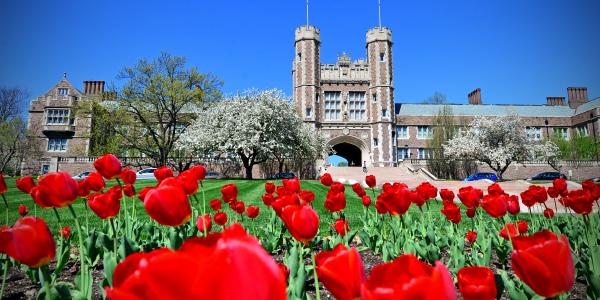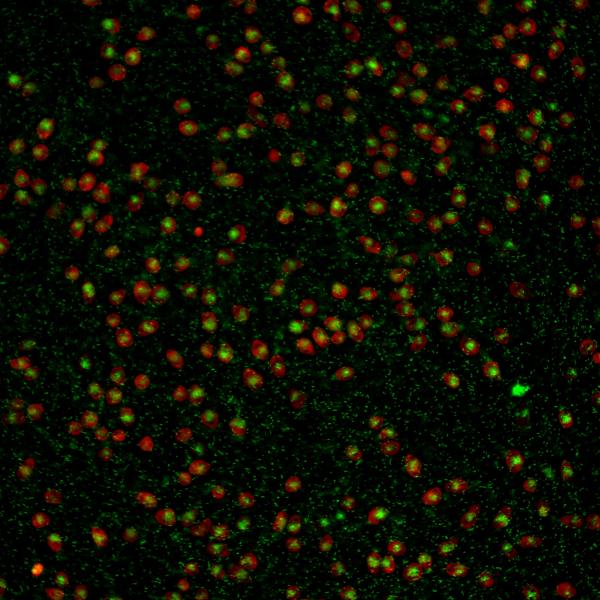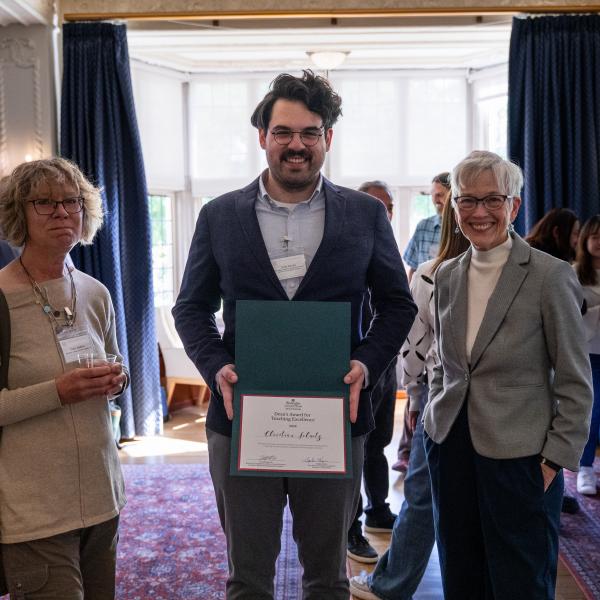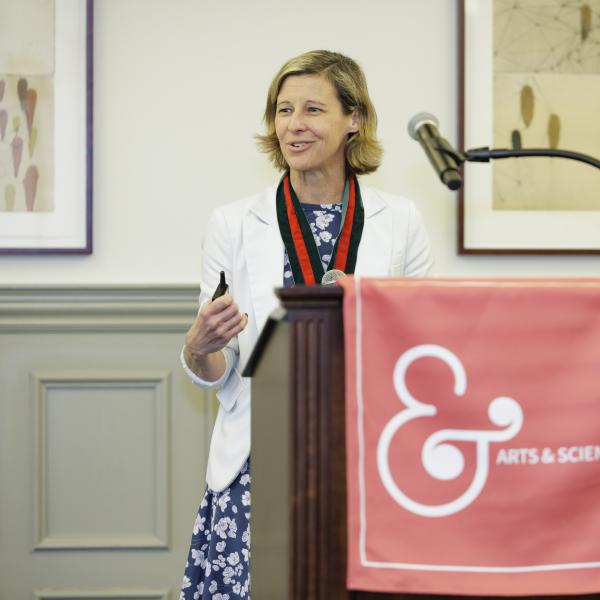Join us in recognizing the achievements and memories of faculty members who are closing out their careers in Arts & Sciences.
N. Mohan Kumar
Department of Mathematics and Statistics
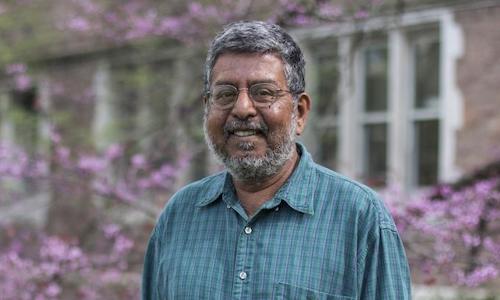 One of N. Mohan Kumar’s most vivid memories from his Washington University career occurred shortly after his arrival at the university in 1993. Kumar had recently moved to St. Louis from India, following a 20-year career at the Tata Institute of Fundamental Research, when his 10-month-old son unexpectedly needed to be hospitalized. “We had very few friends and no family here,” Kumar shared. “But, everyone in the department was so helpful and supportive. They all became family, and I became certain that I had come to the right place.”
One of N. Mohan Kumar’s most vivid memories from his Washington University career occurred shortly after his arrival at the university in 1993. Kumar had recently moved to St. Louis from India, following a 20-year career at the Tata Institute of Fundamental Research, when his 10-month-old son unexpectedly needed to be hospitalized. “We had very few friends and no family here,” Kumar shared. “But, everyone in the department was so helpful and supportive. They all became family, and I became certain that I had come to the right place.”
Kumar's primary research interests are commutative algebra and algebraic geometry. He has a number of favorite courses, but particularly loved teaching honors calculus to undergraduates. “The small class of students was so well motivated. It was a great pleasure to teach them, even though it met five times a week and was two semesters long,” he said.
Kumar intends to continue research in retirement, and he looks forward to devoting undivided attention to that work. When he’s not doing math, you may be able to find him with a book in hand. “I have so many books on my bookshelves that I have yet to read or wish to reread,” he said. “I am also hoping to travel a bit while physically able and possibly expand my cooking skills.”
Martin Israel
Department of Physics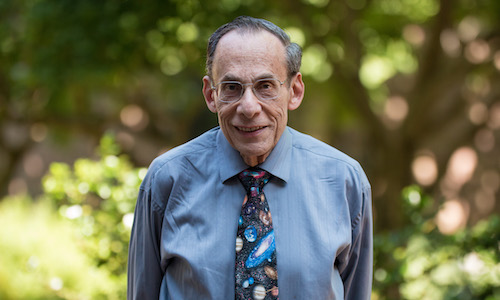
Martin Israel, professor of physics and longtime administrator, joined the Washington University faculty in 1968. As head of the Cosmic Ray Group and a fellow of the McDonnell Center for the Space Sciences, Israel has spent much of his research career studying galactic cosmic rays. “Cosmic rays are not really ‘rays,’” he explained. “They are charged particles, mainly atomic nuclei stripped bare of the electrons. They give us a direct sample of material from elsewhere in our galaxy.” One of many successful cosmic ray experiments, dubbed SuperTIGER, involved sending innovative instruments on a record-breaking, 55-day flight over Antarctica on a high-altitude balloon.
From 1987–1997, Israel served in university administration, including seven years as dean of the Faculty of Arts & Sciences followed by three years as vice chancellor for academic planning. After returning to teaching and research, he continued serving on multiple committees. In recognition of his years of service, Israel was awarded the 2018 Dean’s Medal in Arts & Sciences.
“The best thing about being dean of Arts & Sciences was getting to know many of our outstanding faculty members and learning about their exciting research,” Israel said. “A&S is such a wonderfully diverse organization, including areas with which I was already familiar, like physics and other natural sciences, as well as areas in which I had much to learn – from philosophy and economics to performing arts and music, to name just a few.”
Watch a short video about Marty Israel’s career and service to Washington University.
Joseph Schraibman
Department of Romance Languages and Literatures
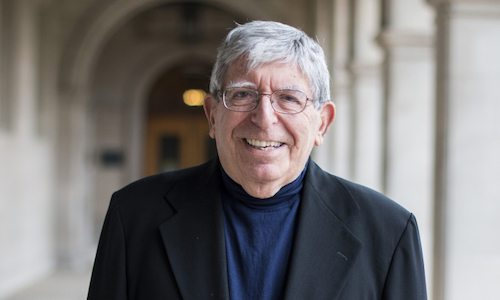 Joseph “Pepe” Schraibman, professor of Spanish, joined the Washington University faculty in 1969. Over the course of five decades at WashU, his roles have included chair of the Department of Romance Languages and Literatures and longtime leader of the first-year Focus (now Ampersand) program on Cuba. His fields of interest include 19th and 20th century Spanish literature and the Spanish Inquisition.
Joseph “Pepe” Schraibman, professor of Spanish, joined the Washington University faculty in 1969. Over the course of five decades at WashU, his roles have included chair of the Department of Romance Languages and Literatures and longtime leader of the first-year Focus (now Ampersand) program on Cuba. His fields of interest include 19th and 20th century Spanish literature and the Spanish Inquisition.
Schraibman taught a wide range of courses, from Medieval Spanish literature to contemporary subjects, and was a sought-after mentor. In 2016, he won the Arts & Sciences Distinguished Teaching Award. At that time, he offered some advice to fellow instructors in Arts & Sciences: “Be passionate about what you do, and care for the students,” he said. “You will end up learning from them, as well.”
Reflecting on his career at Washington University, Schraibman notes positive changes over time and a bright future ahead. “I revel in the greater number of colleagues of all genders, ethnicities, and racial groups. Admissions should continue to pursue this goal, as well,” he said. “All disciplines ought to continue to develop and thrive. Some years ago, I wrote: ‘among all of us we know everything.’ I believe that more than ever.”
Read more about Pepe Shcraibman’s background and teaching philosophy.
Bradley Stoner
Department of Anthropology
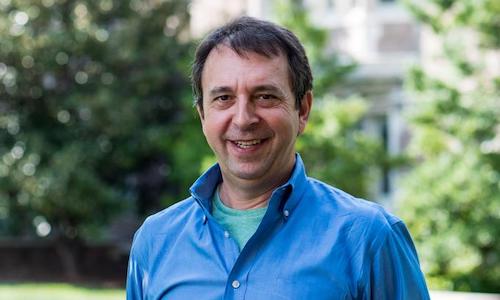
According to Bradley Stoner, one highlight of his years at Washington University has been his leadership of the Medicine and Society program, which he calls “a jewel in the Arts & Sciences crown.” The four-year program offers students a way to explore the social, cultural, and ethical dimensions of health and healthcare through courses in medical anthropology, a community health internship, and a senior thesis or capstone project. “Many of these students have gone on to brilliant careers in medicine, public health, and a variety of related fields, and they have built upon the important anthropological principles they learned as a member of this program,” Stoner said.
Since 1995, Stoner has served in a joint appointment as associate professor of sociocultural anthropology in Arts & Sciences and of infectious diseases/internal medicine at the School of Medicine. In these roles, he “greatly benefitted from the opportunity to combine anthropology and infectious diseases in new and interesting ways,” he explained. Most recently, his work has focused on social and behavioral aspects of sexually transmitted diseases. Stoner now heads the Department of Public Health Sciences at Queen’s University (Canada).
Watch a short video about Bradley Stoner's work.
L. Lewis Wall
Department of Anthropology
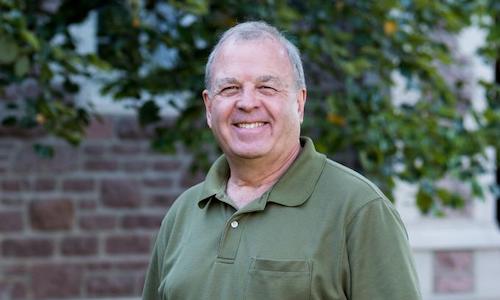 When L. Lewis Wall was named the inaugural Selina Okin Kim Conner Professor in Arts & Sciences for Medical Anthropology, he found the honor unexpected. That moment, along with getting to know David and Paulina Connor, was “the highlight of my WashU career,” Wall recalled.
When L. Lewis Wall was named the inaugural Selina Okin Kim Conner Professor in Arts & Sciences for Medical Anthropology, he found the honor unexpected. That moment, along with getting to know David and Paulina Connor, was “the highlight of my WashU career,” Wall recalled.
In addition to his work in sociocultural anthropology, Wall was a practicing obstetrician-gynecologist and faculty member at the School of Medicine. He is particularly interested in the social and clinical aspects of reproductive health problems in developing countries, and has been actively involved in a variety of clinical projects in Ethiopia, Uganda, Nigeria, Ghana, and Niger.
Several of those projects, including Dignity Period, will continue after Wall’s retirement. Wall and his wife Helen founded the nonprofit in 2014 to support girls in Ethiopia, who often miss school due to the inaccessibility of menstrual products. “We have developed a new set of projects in the United States to deal with the problem of menstrual equity here – especially in St. Louis – while we continue the work in Ethiopia,” said Wall. He also remains on the Board of Governors at a Ugandan hospital dedicated to serving the needs of women with childbirth injuries.
Wall shared his expertise with Arts & Sciences undergraduates in his popular course “Anthropology of Human Birth,” which remained his favorite course to teach. In all of his courses, Wall sought to share a lesson that he continues to put into personal practice: “The most important lesson one can learn is that the secret of true happiness in life is to live for others, not for yourself.”
Hear L. Lewis Wall discuss the origin and goals of the nonprofit organization Dignity Period.
Colette Winn
Department of Romance Languages and Literatures
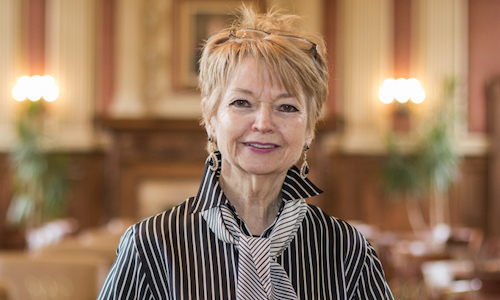 Colette Winn joined the Department of Romance Languages and Literatures in 1980. "At the time, the teaching load was more arduous and there were no provisions for working women, such as maternity leave or childcare,” Winn recalled. “WashU has come a long way since then to the benefit of our younger colleagues.”
Colette Winn joined the Department of Romance Languages and Literatures in 1980. "At the time, the teaching load was more arduous and there were no provisions for working women, such as maternity leave or childcare,” Winn recalled. “WashU has come a long way since then to the benefit of our younger colleagues.”
In her 40-year career as a Professor of French, Winn found great satisfaction in resurrecting the work of unknown women writers, whose work she then shared with students in her “Gender and Genre” seminar. “I was able to rescue from oblivion some thirty minor figures and show how copious and diverse women’s writings were in early modern France,” she said.
Winn also takes pride in the France for the Pre-Med program, which she founded 27 years ago. Students in the immersive summer program travel to France to meet French physicians and learn about the practice and ethics of socialized medicine. “Still today, so many students from past years send me messages raving about fond memories of this program and how it was essential to their preparation for medical school,” Winn shared.
In retirement, Winn plans to continue several research projects, as well as explore creative outlets like painting. Looking back at her career, she said, “I hope future generations of both faculty and students at WashU will be blessed with the good fortune to find stimulation, fulfillment, and happiness in both their careers and their personal lives as I have at this special university.”
